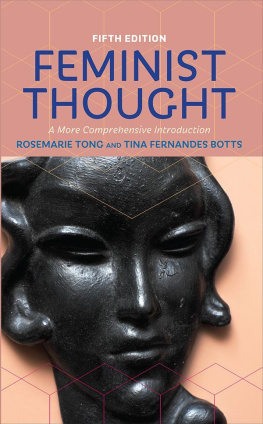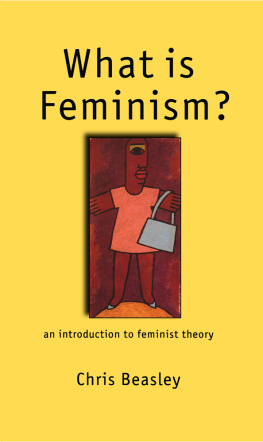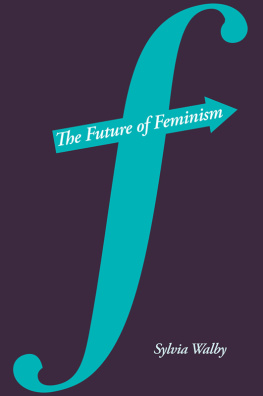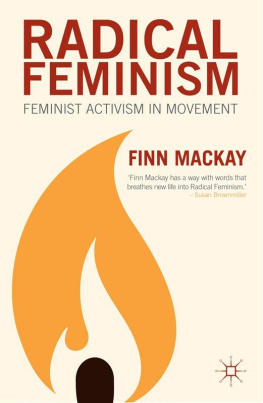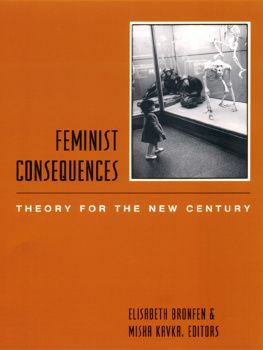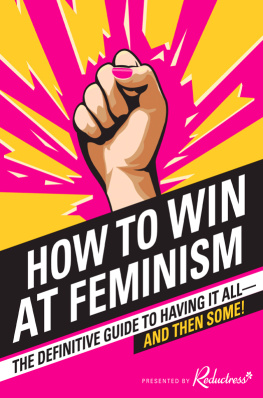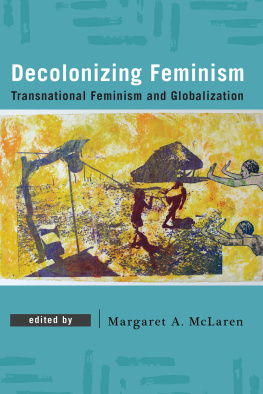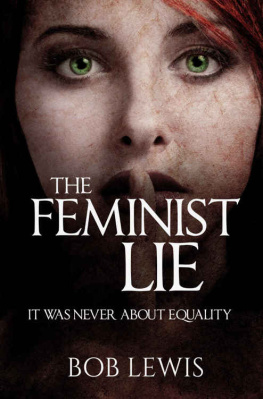Feminist Thought
FIFTH EDITION
Feminist Thought
A MORE COMPREHENSIVE INTRODUCTION
Rosemarie Tong
University of North Carolina, Charlotte
and
Tina Fernandes Botts
California State University, Fresno

First published 2018 by Westview Press
Fifth Edition: July 2017
Published 2018 by Routledge
711 Third Avenue, New York, NY 10017, USA
2 Park Square, Milton Park, Abingdon, Oxon OX14 4RN
Routledge is an imprint of the Taylor & Francis Group, an informa business
Copyright 2018 Taylor & Francis
All rights reserved. No part of this book may be reprinted or reproduced or utilised in any form or by any electronic, mechanical, or other means, now known or hereafter invented, including photocopying and recording, or in any information storage or retrieval system, without permission in writing from the publishers.
Notice:
Product or corporate names may be trademarks or registered trademarks, and are used only for identification and explanation without intent to infringe.
Library of Congress Cataloging-in-Publication Data
Names: Tong, Rosemarie, author. | Botts, Tina Fernandes, author.
Title: Feminist thought : a more comprehensive introduction / Rosemarie Tong,
University of North Carolina, Charlotte, and Tina Fernandes Botts,
California State University, Fresno.
Description: Fifth edition. | Boulder, CO : Westview Press, [2017] | Includes bibliographical references.
Identifiers: LCCN 2016058505| ISBN 9780813349954 (pbk.) | ISBN 9780813350707 (ebook)
Subjects: LCSH: Feminist theory.
Classification: LCC HQ1206 .T65 2017 | DDC 305.4201dc23
LC record available at https://lccn.loc.gov/2016058505
ISBN 13: 978-0-8133-4995-4 (pbk)
LSC-C
Print book interior design by Trish Wilkinson
Contents
The two of us have enjoyed working together on the fifth edition of Feminist Thoughteven though one of us was in Charlotte, North Carolina, retired as an emeritus professor of philosophy, and the other was an assistant professor of philosophy at California State University, Fresno. Committed to making the fifth edition of the book the best yet, we expanded it from seven to ten chapters. Although on third-wave feminism and feminist queer theory and significantly updated and reconfigured our bibliography.
This fifth edition of Feminist Thought contains several substantial changes in addition to many cosmetic ones. We believe that nothing currently on the market is more inclusive of the rich diversity and intersectionality of feminist thought.
As usual we have relied on the help of many people to bring this book to market. First, we wish to acknowledge each other as responsive, responsible, and self-critical coauthors. Second, we want to thank everyone at Westview Press who cheerfully and skillfully aided us. In particular, we want to thank our editors, Elizabeth Hansen and Nikki Ioakimedes; our publisher, Cathleen Esposito; and our editorial director, Grace Fujimoto. In addition, we give special thanks to our project editor, Michael Clark, for shepherding our project through the production process, and our copyeditor, Jennifer Kelland, for polishing our manuscript. Their help unified and improved our two distinct styles. Finally, we wish to thank our patient and conscientious typist, Pamela Eudy, who kept track of our many draftings and redraftings. We cannot overemphasize her dedication to the fifth edition.
While working on the fifth edition of Feminist Thought, we have become increasingly convinced that feminist thought resists categorization into tidy schools. Interdisciplinary, intersectional, and interlocking are the kinds of adjectives that best describe feminist thinking. There is an exhilaration in the way we feminists move from one idea to the next, revising our thoughts in midstream. Yet, despite the very real challenges that accompany trying to categorize the thought of an incredibly diverse and large array of feminist thinkers, feminist thought is old enough to have a history complete with a set of labels: liberal, radical, Marxist/socialist, women-of-color, global, postcolonial, transnational, psychoanalytic, care-focused, ecofeminist, existentialist, poststructural, postmodern, third-wave, and queer. To be sure, this list of labels is incomplete and contestable. It probably does not capture the full range of feminisms intellectual and political commitments to women and society in general. Yet feminist thoughts traditional labels remain serviceable. They signal to the public that feminism is not a monolithic ideology and that all feminists do not think alike. The labels also help mark the number of different approaches, perspectives, frameworks, and standpoints that a variety of feminists have used to shape both their explanations for womens oppression and their proposed solutions for its elimination.
Because so much of mainstream feminist theory reacts against traditional liberal feminism, liberalism is as good a place as any to begin a survey of feminist thought. This perspective received its classic formulation in Mary Wollstonecrafts A Vindication of the Rights of Woman, and the nineteenth-century womens suffrage movement. Its main thrust, an emphasis still felt in such groups as the National Organization for Women (NOW), is that female subordination is rooted in a set of customary and legal constraints that block womens entrance to and success in the public sphere. To the extent that society holds the false belief that women are, by nature, less intellectually and physically capable than men, it tends to discriminate against women in the academy, the forum, and the marketplace. As liberal feminists see it, this discrimination against women is unfair. Women should have as much chance to succeed in the public realm as men do. Gender justice, insist liberal feminists, requires us, first, to make the rules of the game fair and, second, to ensure that none of the runners in the race for societys goods and services are systematically disadvantaged.
But is the liberal feminist program robust enough to undo womens oppression? Radical feminists think not. They claim that power, dominance, hierarchy, and competition characterize the patriarchal system. It cannot be reformed but only ripped out, root and branch. Radical feminists insist that it is not enough for us to overturn patriarchys legal and political structures on the way to womens liberation; we must also thoroughly transform its social and cultural institutions (especially the family and organized religion).
As in the past, we remain impressed by the diverse modalities of thinking that count as radical feminist thought. Although all radical feminists focus on sex, gender, and reproduction as the loci for the development of feminist thought,
With respect to issues related to sexuality, radical-libertarian feminists argue that no specific kind of sexual experience should be prescribed as the best. Every woman should be encouraged to experiment sexually with herself, with other women, and with men. Although heterosexuality can be dangerous for women within a patriarchal society, women must nonetheless feel free to follow their own desires, even if that means embracing men.
Radical-cultural feminists disagree. They stress that through pornography, prostitution, sexual harassment, rape, and woman battering, Only alone, or with other women, can women discover the true pleasure of sex.
Radical feminist thought is as diverse on issues related to reproduction as it is on matters related to sexuality. Radical-libertarian feminists claim biological motherhood drains women physically and psychologically. Women should be free, they say, to use the old reproduction-controlling technologies and the new reproduction-assisting technologies on their own termsto prevent or terminate unwanted pregnancies or, alternatively, to have children when they want them (pre- or postmenopausally), how they want them (from their own womb or that of another woman), and with whom they want them (a man, a woman, or alone). Some radical-libertarian feminists go further than this, however. They look forward to the day when ectogenesis (extracorporeal gestation in an artificial uterus) entirely replaces the natural process of pregnancy.

